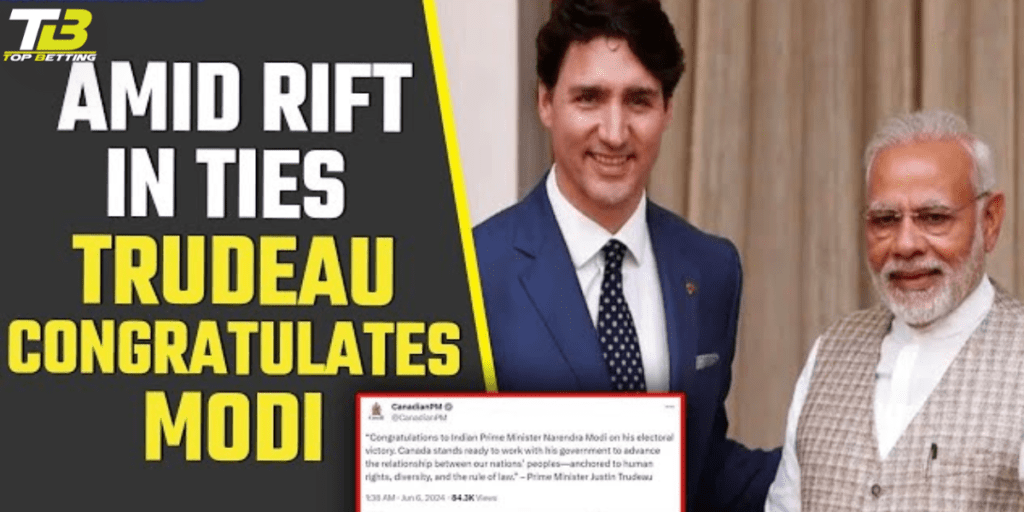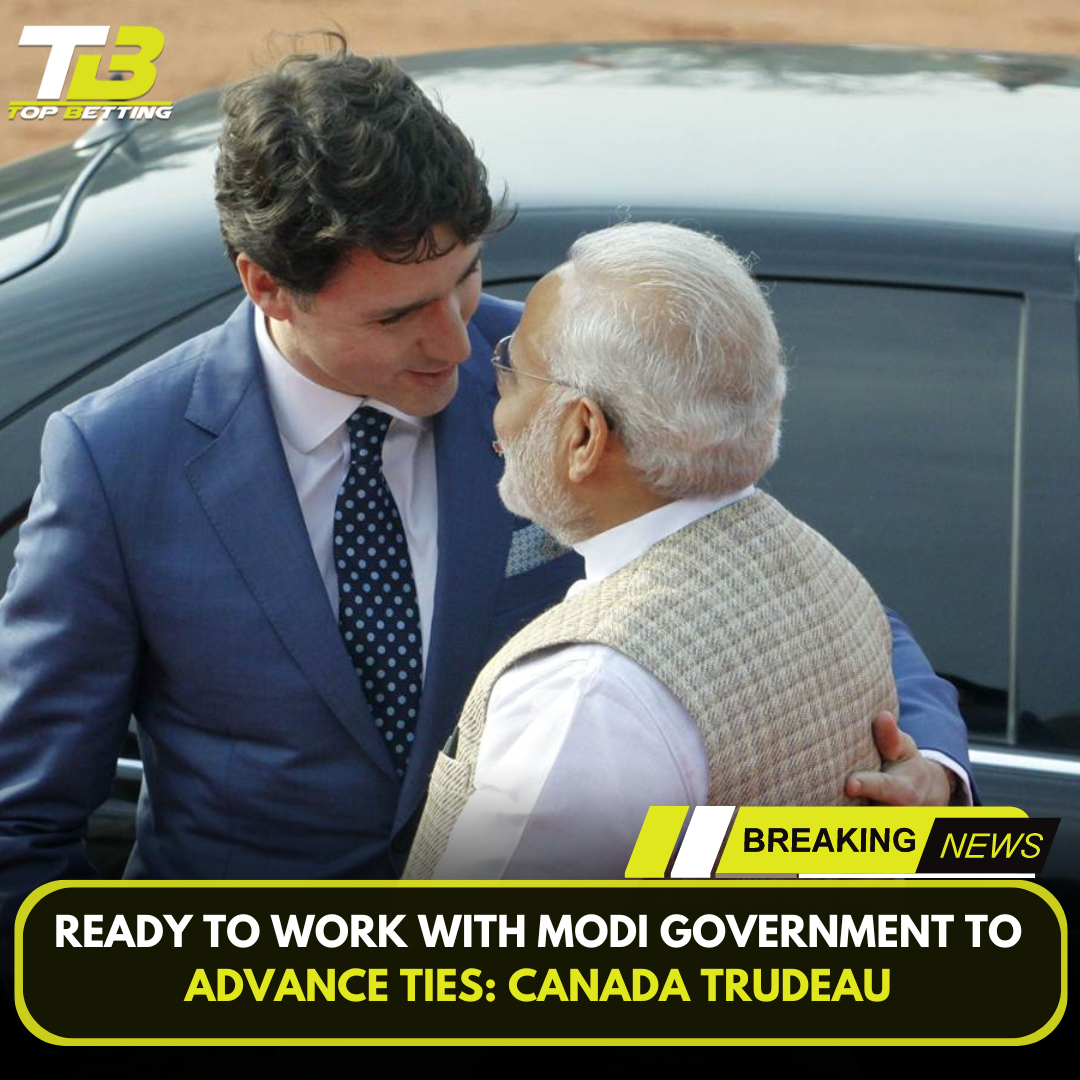
Canada Trudeau Modi government to advance ties
The relationship between Canada and India has undergone a complex and dynamic journey in recent years. From moments of strain to renewed overtures for cooperation, the two nations have navigated a delicate diplomatic landscape, each seeking to advance its respective interests on the global stage. In a significant development, Canadian Prime Minister Justin Trudeau has congratulated his Indian counterpart, Narendra Modi, on securing a historic third term in office, signaling a potential thaw in the frosty ties that have characterized the Canada-India relationship.
Trudeau’s Congratulatory Message: A Diplomatic Olive Branch
In a statement released by his official account on the social media platform X, Canada Trudeau expressed his congratulations to Prime Minister Modi, emphasizing Canada’s readiness to work with the newly re-elected Indian government to “advance the relationship between our nations’ peoples — anchored to human rights, diversity, and the rule of law.” This gesture represents a marked shift from the previous tensions that had marred the bilateral relationship, hinting at a renewed commitment to fostering closer ties between the two countries.
Resolving the Khalistani Conflict: A Shared Challenge
One of the primary sources of friction in the Canada-India relationship has been the issue of Sikh separatism, particularly the Khalistan movement. India has long viewed the activities of pro-Khalistani groups operating within Canada as a matter of national security, a sentiment echoed by the Indian High Commissioner to Canada, Sanjay Kumar Verma. The arrest of several individuals in Canada in connection with the killing of a pro-Khalistani leader, Hardeep Singh Nijjar, has further exacerbated the tensions between the two nations.
Navigating the Diplomatic Minefield: Calls for Transparency
In the aftermath of these arrests, India has expressed its dissatisfaction with the lack of “specific or relevant evidence” or information shared by the Canadian authorities. This perceived lack of transparency has only served to deepen the mistrust between the two countries, underscoring the need for a more open and collaborative approach to addressing the complex issues at hand.
Reaffirming Commitment to Human Rights and Diversity
Trudeau’s reference to “human rights, diversity, and the rule of law” in his congratulatory message to Prime Minister Modi suggests a renewed emphasis on these core values as the foundation for the Canada-India partnership. This alignment of principles could pave the way for a more constructive dialogue, one that recognizes the importance of safeguarding individual liberties and fostering inclusive societies.
Navigating Competing Priorities: Balancing National Security and Diplomatic Ties
The delicate balance between national security concerns and the imperatives of diplomatic relations has been a persistent challenge in the Canada-India dynamic. As India continues to view the activities of pro-Khalistani groups within Canada as a matter of grave importance, the Canadian government must navigate this sensitive terrain, seeking to address India’s security concerns while upholding its own commitment to democratic freedoms and the rule of law.
Strengthening Bilateral Cooperation: Opportunities for Advancement
The congratulatory message from Trudeau to Modi presents a unique opportunity for the two nations to explore new avenues of cooperation, building upon their shared interests and complementary strengths. From economic partnerships and trade agreements to collaborative efforts in areas such as technology, climate change, and global governance, the Canada-India relationship holds immense potential for mutual benefit and growth.
Fostering Cultural Exchanges and People-to-People Ties
Beyond the realm of high-level diplomacy, the Canada-India relationship can be further strengthened through the promotion of cultural exchanges, educational collaborations, and people-to-people connections. By facilitating the free flow of ideas, talents, and experiences between the two countries, a deeper understanding and appreciation of each other’s societies can be cultivated, laying the groundwork for a more robust and enduring partnership.
Embracing a Multilateral Approach: Coordinating on Global Challenges
As Canada and India navigate the complexities of their bilateral relationship, the potential for collaboration on the global stage should not be overlooked. By coordinating their efforts and aligning their positions on pressing international issues, such as climate change, global health, and the rules-based international order, the two nations can amplify their voices and contribute to the collective resolution of shared challenges.
Addressing Asymmetries and Imbalances: Towards Equitable Engagement
While the Canada-India relationship has historically been characterized by a certain degree of asymmetry, with India often perceived as the more influential partner, the recent electoral victory of Prime Minister Modi presents an opportunity to reevaluate the dynamics of this engagement. By fostering a more equitable and mutually beneficial partnership, the two countries can unlock the full potential of their collaboration, ensuring that the relationship serves the interests of both nations and their respective populations.
Navigating Shifting Geopolitical Landscapes: Adapting to Emerging Realities
As the global landscape continues to evolve, with shifting power dynamics and emerging regional alliances, Canada and India must be vigilant in adapting their diplomatic strategies to the changing realities. By maintaining open lines of communication, identifying shared priorities, and cultivating a nuanced understanding of each other’s strategic concerns, the two countries can position themselves to navigate the complexities of the 21st century geopolitical landscape effectively.
Embracing a Long-Term Vision: Charting a Sustainable Path Forward
Ultimately, the Canada-India relationship must be grounded in a long-term vision that transcends the ebbs and flows of political cycles and short-term interests. By embracing a comprehensive, strategic approach that prioritizes the well-being of their citizens, the preservation of democratic values, and the advancement of shared prosperity, the two nations can chart a sustainable path forward, cementing their status as reliable partners on the global stage.

Conclusion
The congratulatory message from Prime Minister Trudeau to his Indian counterpart, Narendra Modi, marks a significant turning point in the Canada-India relationship. As the two nations embark on a new chapter of diplomatic engagement, they must seize the opportunity to address the lingering tensions, foster greater mutual understanding, and unlock the vast potential for collaboration that exists between them. By embracing a spirit of openness, transparency, and a shared commitment to human rights, diversity, and the rule of law, Canada and India can forge a partnership that not only serves their respective national interests but also contributes to the betterment of the global community as a whole.











